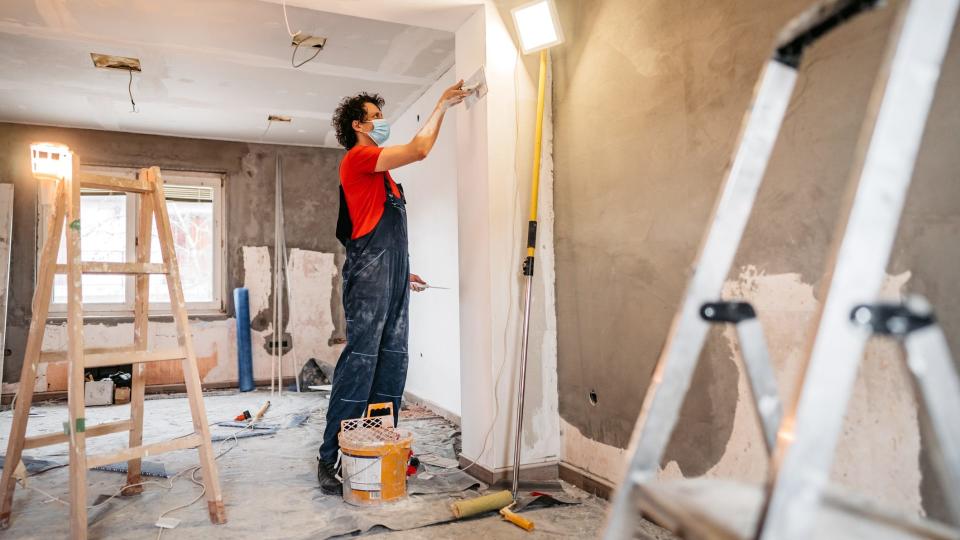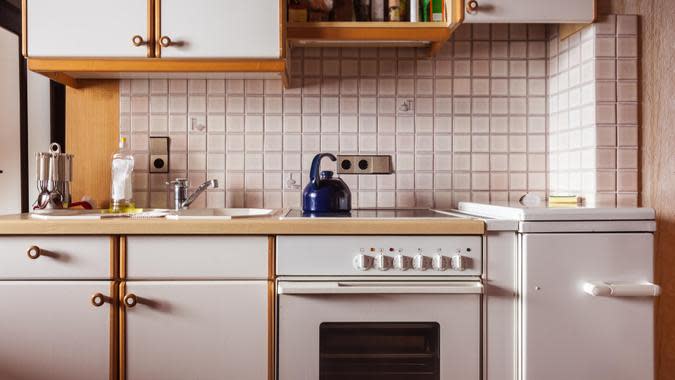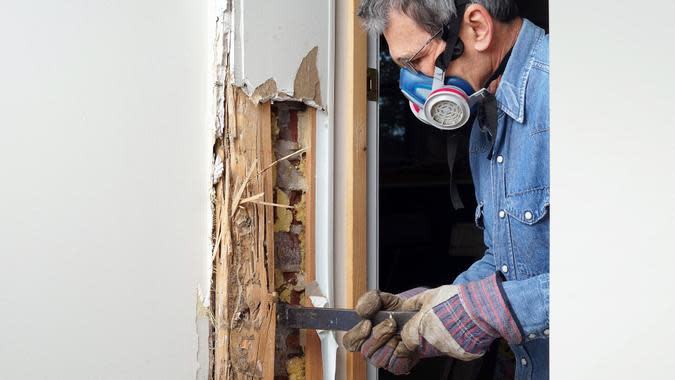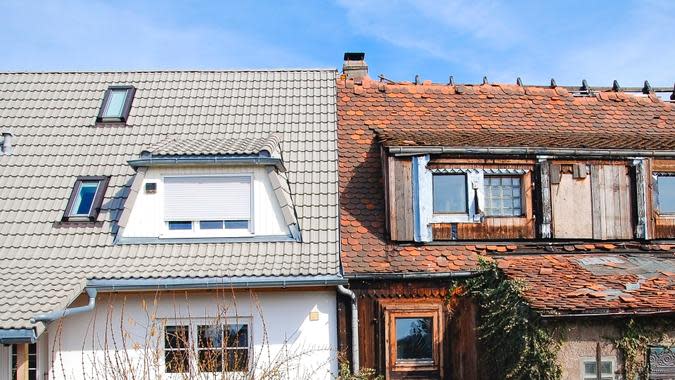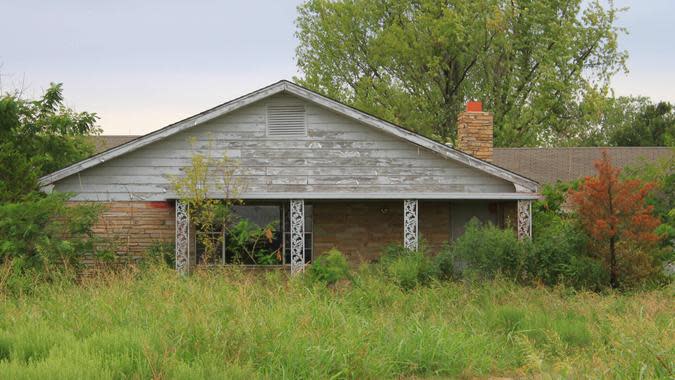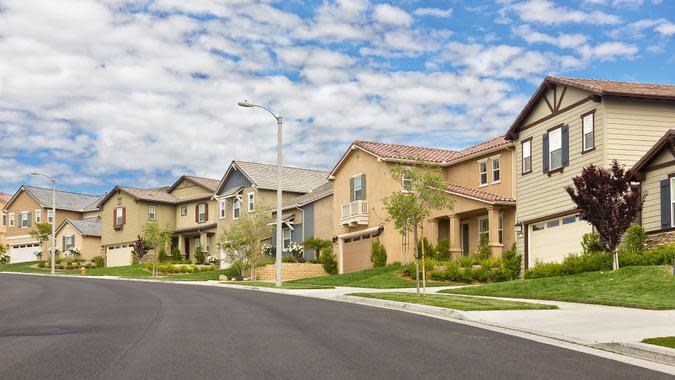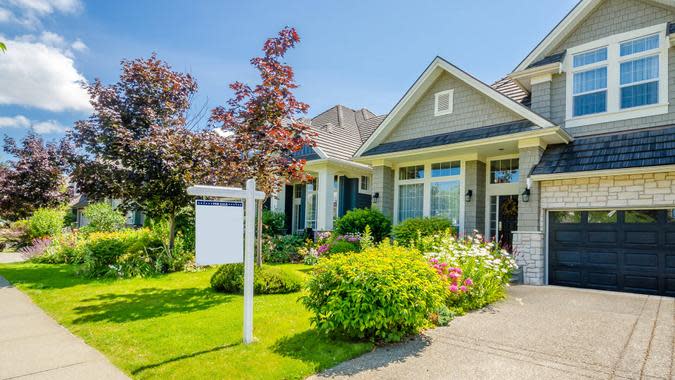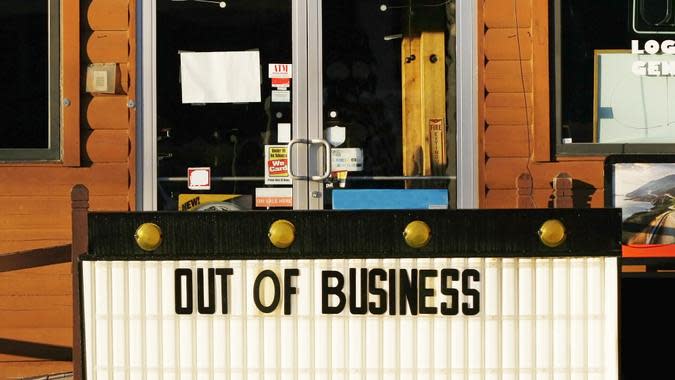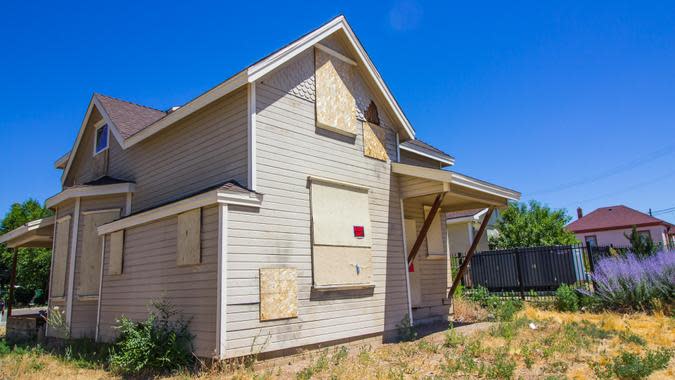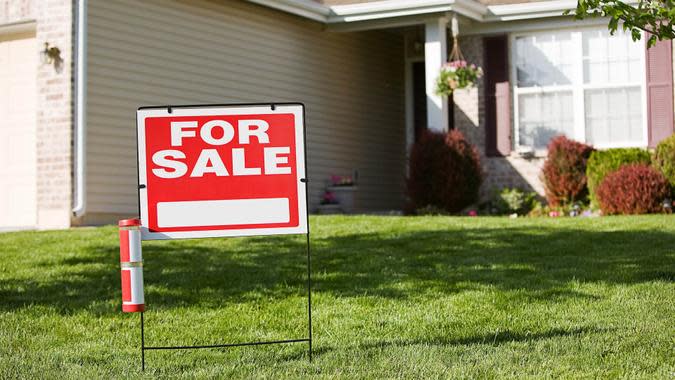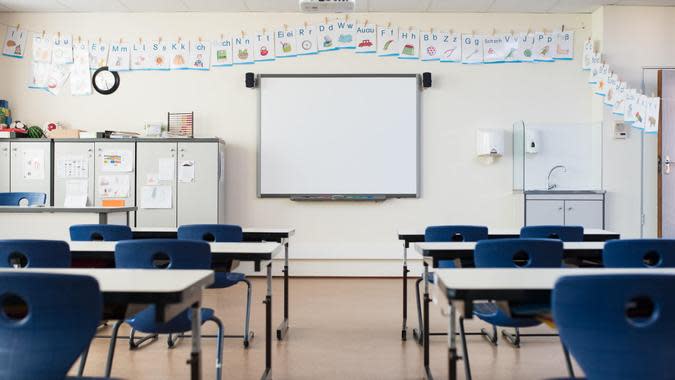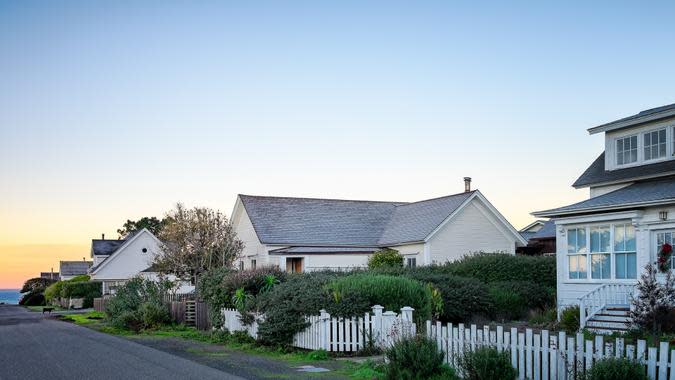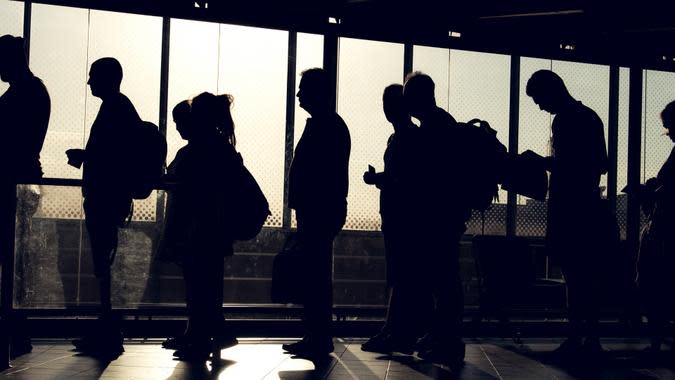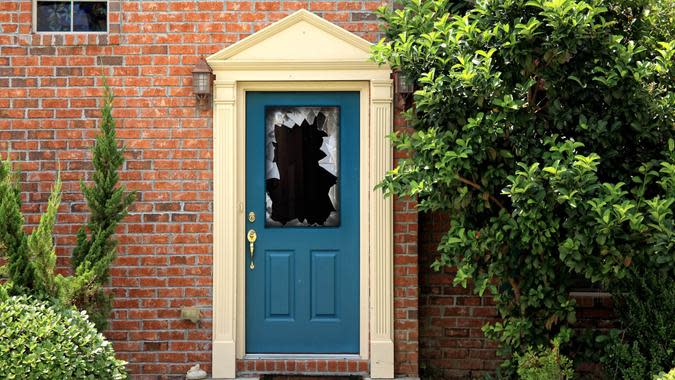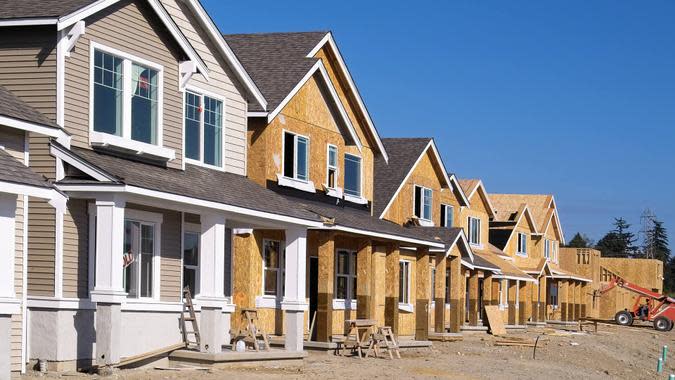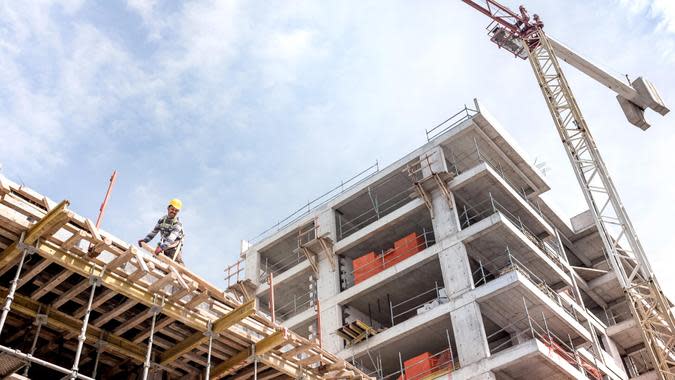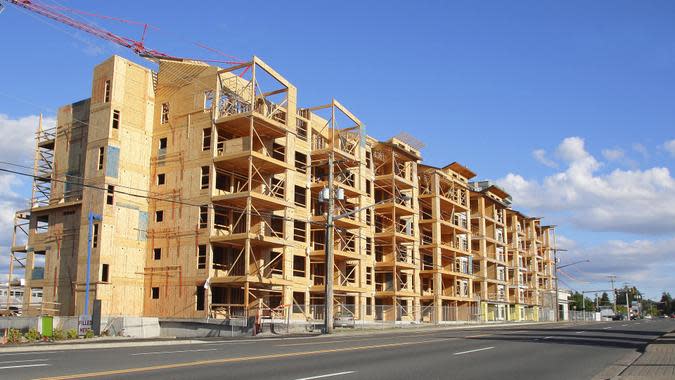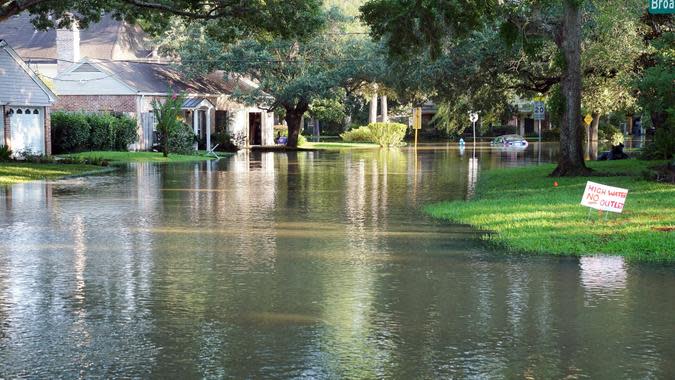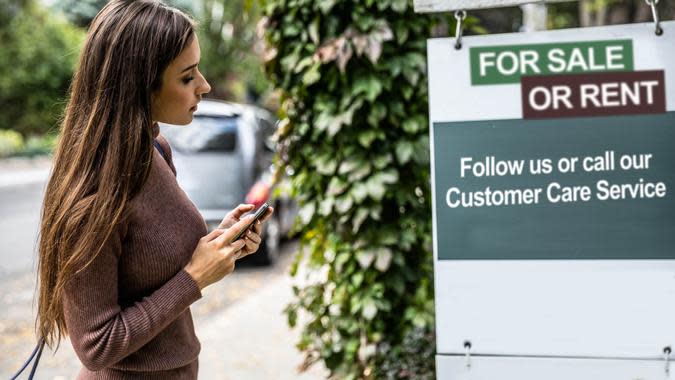Home values in the U.S. increased by about $2 trillion in 2023, reaching a whopping total value of $47.5 trillion. For home sellers, that’s good news. However, you shouldn’t assume that the trend of rising home values ensures your home will increase in value.
Related Reading: 5 Types of Homes That Will Plummet in Value in 2024
Up Next: 5 Genius Things All Wealthy People Do With Their Money
In fact, there are a variety of factors — some within your control, some that are not — that could signal your home won’t be worth as much soon. Keep reading to learn the signs that your house is losing value.
Your Home Is Dated Compared With Nearby Properties
Your house might not fetch top dollar if you haven’t bothered to update it. “Are your kitchen and bathrooms from the ‘Brady Bunch’ era while most of the recent sales in your neighborhood had the smooth, quartz countertops and stainless-steel appliances?” said Conor MacEvilly, a Seattle realtor. “Sure, pink tile bathrooms will one day be chic again — for a few fleeting months — but, in the meantime, dated means a potentially lower home value.”
Updating your home will likely help you sell it for more. However, that amount might not be enough to recoup the cost of the updates. “So, if your kitchen and bathrooms are dated but functional, then the net proceeds from the sale of your home might be the same whether you remodel it or not,” MacEvilly said.
Look Ahead: In Less Than a Decade, You Won’t Be Able To Afford Homes in These ZIP Codes
Southern Living: 25 Safest and Cheapest Cities To Live in the South
Sponsored: Protect Your Wealth With A Gold IRA. Take advantage of the timeless appeal of gold in a Gold IRA recommended by Sean Hannity.
You’re Not Staying On Top of Home Maintenance
Failing to keep up with maintenance and repairs on your home is a sure sign that it will start losing value as problems accumulate, said content strategy expert Daniela Andreevska. This includes mold and insect infestation problems, which can compromise the value of your property, she said.
Build an emergency fund to pay for home repairs when they are needed. Otherwise, if you don’t spend the money to keep your house maintained, you could have trouble selling your home.
Check Out: 10 Things Frugal People Always Do When They First Buy a House
Your Neighbors Aren’t Maintaining Their Homes
Don’t assume that maintaining your home will protect its value. “Neighbors who allow their homes to fall into disrepair can affect the value of your home,”said Lou De Medici, owner of Fast Cash Homes MN. Unfortunately, you can’t control whether your neighbors are maintaining their homes.
You’re Neglecting Your Home’s Curb Appeal
If you’re trying to figure out how to increase your home value, start by paying attention to how it looks to potential buyers. Your home won’t make a good first impression if you haven’t bothered to improve its curb appeal. “Simple upgrades such as new landscape and fresh coats of paint can help boost your home’s value,” said Sacha Ferrandi, founder and principal of real estate lending company Source Capital.
Inventory in the Housing Market Rises
The value of your home is tied to the housing market in your area, and a crowded housing market could spell trouble for your home’s value. “When inventory in the housing market rises, the value of your home has high potential to decrease,” said Bryan Bowles, founder and CEO of real estate technology platform Transactly. “Competition between sellers for buyers will increase and force prices down.”
You’ll likely have to go the extra mile to ensure your home stands out from comparable properties to avoid having to lower your price to get a buyer.
Retirement Planning: Why Florida’s Retirees Are Fleeing — And Where They’re Going Instead
Nearby Homes Are Selling for Low Prices
Smart buyers will check the list prices and sale prices of homes to determine what a fair market price is in your neighborhood. “If your neighbors recently sold a house for a low price, buyers will often expect your house to also be priced low,” said Ben Mizes, CEO and co-founder of Clever Real Estate.
If you find out what sets your house apart from the lower-priced house, you might be able to justify your property’s higher price if you’re selling your home.
Your Neighborhood Is Hit By an Economic Slowdown
Your home could lose value if your neighborhood falls on hard times. “One definite sign is that businesses are moving away from your neighborhood,” Andreevska said. “This means that there will be fewer jobs, and fewer people will be willing to live in your area, so real estate prices will go down.”
If you see that one business has closed or left your neighborhood, don’t wait for more to follow suit before putting your house on the market. Act quickly if you’re thinking about selling.
There Are Several Foreclosures in Your Neighborhood
Your home value could drop if houses in your neighborhood are in foreclosure. “Even if you are not at the risk of foreclosure, buyers will believe you are if too many houses around yours have been repossessed by banks,” Andreevska said. “Buyers will not be willing to pay market value for your home, as they would think that you may go into foreclosure in a couple of months, after which they will be able to buy your home for much cheaper.”
Learn More: Housing Market 2024: Zillow Predicts 5 Hottest Home Trends That Homebuyers Will Be Looking For
There Are Lingering ‘For Sale’ Signs
Your neighbors’ inability to sell their homes quickly is a sign that your home could lose value. “If you notice that houses in your neighborhood have had those ‘For Sale’ signs up on their lawn for a long time, this is a bad omen for selling your own property,” said Jennifer Harder, founder and CEO of Jennifer Harder Mortgage Brokers. There could be a variety of underlying reasons these homes aren’t selling. Some certainly could impact the price of your home.
Interest Rates Rise
When mortgage interest rates rise, homebuyer demand tends to drop, said Ryan Fitzgerald, owner of Raleigh Realtyin Raleigh anduphomes in Charlotte, North Carolina. This could have a big impact on your home’s value, he said. As interest rates increase, the number of people who can afford your home at its current price decreases because the cost of getting a mortgage to buy the home will rise.
School Performance Declines
Homebuyers with children pay close attention to how good the schools are in the areas where they are looking to buy homes. Homes in the best districts can sell at a premium. On the other hand, “school systems performing poorly on rankings may make your neighborhood less desirable,” De Medici of Fast Cash Homes MN said.Even if you don’t have kids, you should pay attention to how well the schools in your area are performing. If they fall in the rankings, your home’s value could fall along with them.
Your City’s Population Is Shrinking
Your city’s population actually can impact your property value. “If you have a declining population, you can be sure that means the buyers for your home are declining as well,” Fitzgerald said. It can also mean the number of houses on the market can increase if there are fewer buyers. “If inventory increases, that’s another sign your home’s value is about to begin trending downward,” he said.
Sunshine State: 7 Florida Cities That Could Be Headed for a Housing Crisis
Unemployment Is Rising in Your Community
Pay attention to news reports about the unemployment rate in your city. If it’s rising, your property value could decline. “Rising unemployment in the local area may preclude a softening market and a lower demand for housing,” De Medici said.
Even if just one major employer leaves your community, or a major industry in your state falls on hard times, your home value could fall. “Think when Michigan lost the auto industry during the Great Recession,” De Medici said.
Crime Rates Rise
An increase in the crime rate in your neighborhood or neighbors with a criminal record could significantly decrease the value of your home, said Ferrandi. “If there are ongoing signs of disruptive behavior and activity, your neighborhood’s overall value could decrease, in turn decreasing the value of each home itself,” he said. And businesses will shy away from opening up in areas with high crime rates, which also can hurt home values.
Property Tax Rates Rise
If your local or state government raises property tax rates, it could hurt the value of your home, De Medici said. Potential buyers might be scared off by the higher tax rates, which makes it hard to sell your home without dropping the price.
New Neighborhoods Are Developed Nearby
If a developer builds a new residential neighborhood in your area, you can see the price of your own home decrease, Mizes said. “When given the option of buying a newer home, buyers will expect your home to be priced lower accordingly.”
Discover More: 8 States To Move to If You Don’t Want To Pay Taxes on Social Security
Undesirable Construction Is Proposed
Keep an eye on the news so you’ll know if there is construction proposed that could impact your home value. For example, a factory, power plant or major roadway being built near your home could be a turnoff to potential buyers, De Medici said. You might be able to avoid a drop in your home’s value, though, by selling before construction begins.
Your Neighborhood Experiences Zoning Changes
Your home value could take a hit if property owners in your neighborhood get the zoning changed for their land. “When zoning changes occur from single-family homes to multi-family or a commercial district, property values tend to decline with more traffic brought to the immediate area,” said Ginna Currie, a New York state general appraiser at CT Appraisals.
Zoning changes typically require public hearings, where you can voice your objection to a change if you fear it could affect your property’s value. You might be able to prevent the zoning change if you get enough of your neighbors to help you object to the change.
Your Home Is Included In a Floodplain
Your property value can decline if your community’s flood map boundaries are redrawn to include your home. “With the cost of flood insurance on the rise, homes that sit within the floodplain can experience slow growth or even negative valuations,” said Brad Pauly, broker and owner of Pauly Presley Realtyin Austin, Texas.
If you think your home was incorrectly included in a flood zone, you can submit an application to the Federal Emergency Management Agency at FEMA.govto request a change to your designation.
The Rental Market Is Hot
If rental units are being built and filling up quickly, that could spell bad news for your home’s value. De Medici said a hot rental market can be a sign of a softening housing market. It suggests that people are more inclined to rent than buy. As a result, home values can fall. You might find it’s easier — and smarter financially — to rent out your home rather than sell it for a low price.
Laura Beck contributed to the reporting for this article.
More From GOBankingRates
Suze Orman: 5 Social Security Facts Every Soon-To-Be Retiree Must Know
Avoid These 7 Cars That Will Only Last You Half as Long as the Average Vehicle
These 10 Aldi Brand Products Are Worth Every Penny
The Biggest Mistake People Make With Their Tax Refund -- And How to Avoid It
This article originally appeared on GOBankingRates.com: 20 Key Signs That Your House Is Losing Value — and What To Do About It
